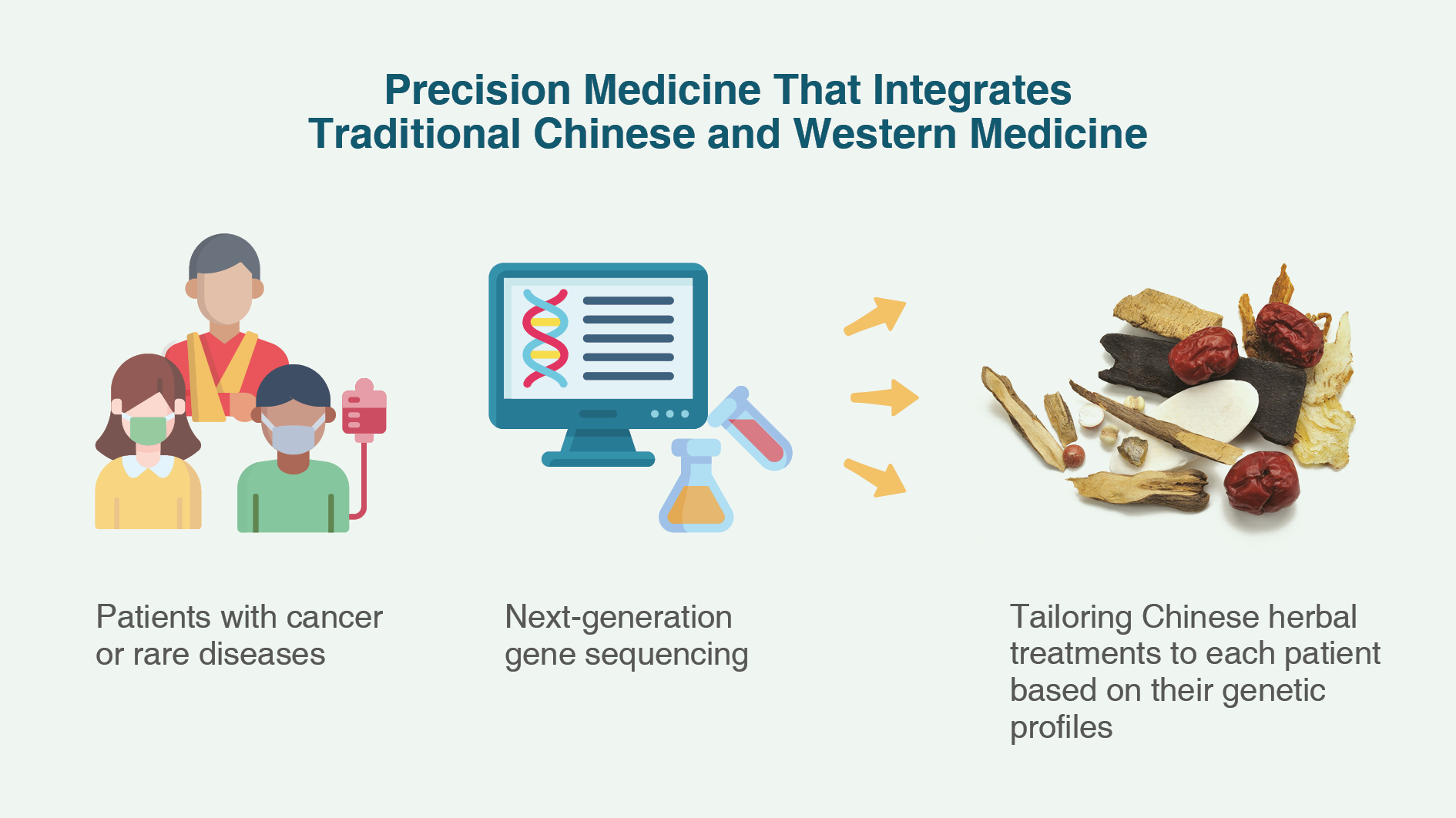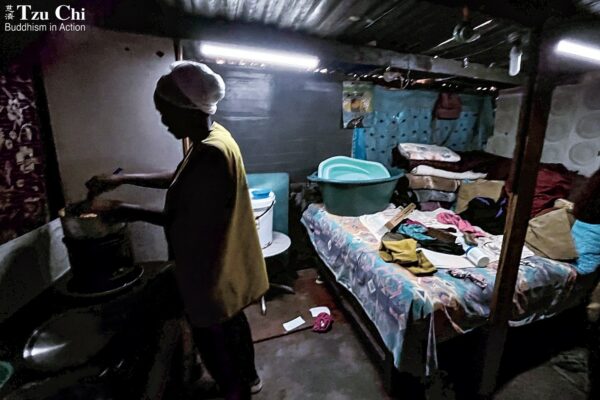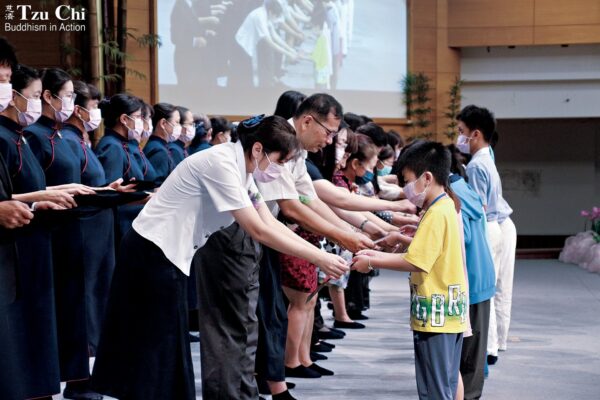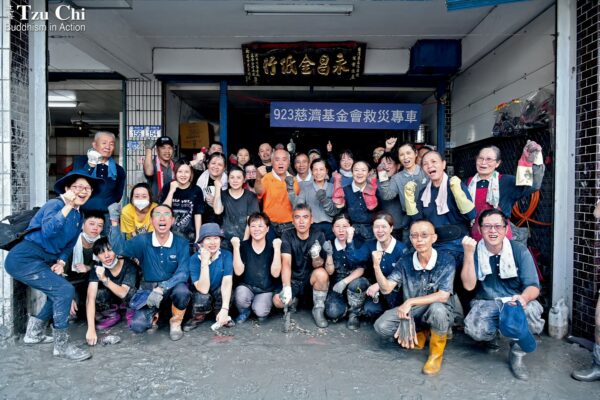By Zhang Li-yun
Translated by Wu Hsiao-ting
Photos by Li Yan-shu
Hualien Tzu Chi Hospital provides precision medicine that integrates both traditional Chinese and Western medical practices for the effective treatment of severe and challenging conditions.
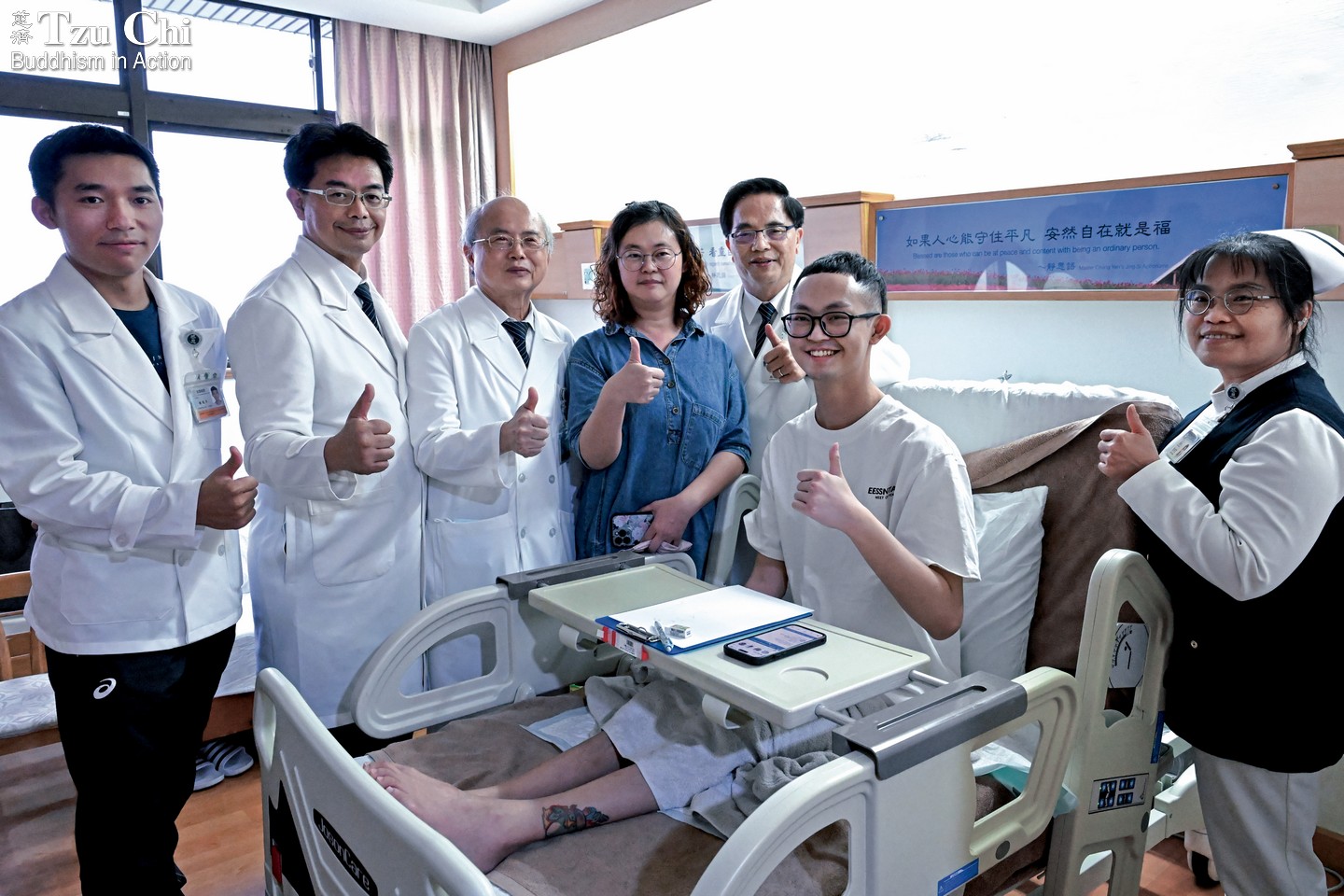
Tu Bo-yu (seated), a patient receiving precision medicine that integrates traditional Chinese and Western treatments, has made good progress under the care of Lin Shinn-zong (fifth from left), Chang Jan-gowth (third from left), and Ho Tsung-jung (second from left).
In March 2024, 23-year-old Tu Bo-yu (涂博俞) was admitted to Hualien Tzu Chi Hospital in eastern Taiwan with a diagnosis of adrenomyeloneuropathy—a form of adrenoleukodystrophy, a rare genetic disorder that poses significant treatment challenges. His symptoms included bladder and bowel dysfunction, as well as paralysis below the chest. Lorenzo’s oil has traditionally been used to manage symptoms, but recent advancements in gene therapy are now being explored. However, such treatment remains prohibitively expensive, and its efficacy is still under evaluation.
Adrenoleukodystrophy is caused by mutations in the ABCD1 gene, leading to the build-up of very long chain fatty acids. Dr. Lin Shinn-zong (林欣榮), superintendent of Hualien Tzu Chi Hospital and a specialist in neuroscience and neurosurgery, explained, “These fatty acids disrupt the myelin sheath’s role in conducting nerve signals, preventing messages from the brain from reaching the hands and feet. Patients can deteriorate rapidly and may not survive for long.”
Faced with this complex neurodegenerative disease, Dr. Lin has been actively seeking solutions. “Master Cheng Yen often reminds us that all forms of life in the world are interconnected and imbued with a life force,” he said. “For every illness, nature offers a remedy. Since Western medicine has its limitations, we have enlisted the help of traditional Chinese herbal medicine while using molecular biology to explore methods that may help break down these fatty acids. Professor Chang Jan-gowth [張建國], an expert in next-generation whole-genome analysis, has been providing invaluable insights.”
In mid-February 2024, Taiwan’s Ministry of Health and Welfare announced plans to include next-generation genome sequencing testing in National Health Insurance coverage. Following this announcement, Hualien Tzu Chi Hospital established a molecular tumor committee on February 21. The committee combines multiple specialties from both Western and traditional Chinese medicine to provide more precise treatments for patients with cancer and rare diseases. The committee is chaired by Dr. Lin, with Professor Chang serving as vice chair. Professor Chang specializes in genetic diagnostics and in applying traditional Chinese medicine to cancer treatment.
Dr. Lin noted that the precision medicine team at the hospital employs gene testing to clearly identify the causes of diseases and find effective herbal remedies. This approach has produced significant results over the past six months. For adrenoleukodystrophy, Professor Chang has developed a strategy to identify compensatory genes similar to ABCD1. Dr. Lin explained, “We are targeting the normal ABCD2 and ABCD3 genes for therapy, after discovering Chinese herbs that can act on these two genes. Vice Superintendent Ho Tsung-jung [何宗融] has prescribed these herbal remedies to patients, and the effects have been impressive.” Through their collective efforts, the team is overcoming traditional treatment bottlenecks through endogenous stem cell therapy, acupuncture, and herbal treatments.
Precision medicine
Precision medicine employs advanced technologies, such as genetic sequencing, to develop treatment plans tailored to each patient’s genetic profile, thereby improving cure rates and reducing side effects. Dr. Lin pointed out that this approach has evolved into personalized treatment. “By analyzing a patient’s DNA and RNA, we can identify genetic deficiencies and apply the appropriate Western medicines,” he said. “What sets our team at Hualien Tzu Chi Hospital apart is that we’re the only ones in the world using DNA and RNA analysis to pinpoint precise traditional herbal medicines for specific conditions.”
Hualien Tzu Chi Hospital’s commitment to researching traditional Chinese herbal medicine dates back to 2020, during the COVID-19 pandemic. As the outbreak unfolded, Master Cheng Yen pointed out that, in ancient times, when Western medicine was not widely available, people relied on traditional herbal remedies to combat epidemics. She expressed hope that Tzu Chi healthcare professionals would study herbal treatments for the prevention and treatment of COVID-19.
Under Dr. Lin’s leadership, the hospital developed Jing Si Herbal Tea, designed to deliver antiviral, anti-inflammatory, and anti-thrombotic benefits, thereby improving treatment outcomes for patients with mild to moderate COVID-19. The herbal tea can also serve as a daily health supplement. Building on this foundation of research into traditional herbal remedies, the team more recently extracted a small molecule called z-BP from the traditional Chinese herb Angelica sinensis to develop a new drug for malignant brain tumors. Clinical trials conducted on 20 brain cancer patients showed significant tumor reduction just one month after Angelica patches were implanted in their brain.
Reflecting on the public’s fear during the pandemic and the high costs of Western treatments for cancer, degenerative diseases, and rare conditions, Dr. Lin expressed great hope for the integrated precision medicine efforts at the hospital: “By drawing on Professor Chang’s expertise, we believe traditional Chinese medicine can also play a role in combating cancer and aging, offering patients renewed hope in their healing journey.”
In the realm of innovative treatments, Dr. Lin Shinn-rong stands out as the first in Taiwan to successfully transplant embryonic neural stem cells into Parkinson’s disease patients. He is also a global pioneer in using autologous peripheral blood stem cells for stroke treatment: “In the case of Parkinson’s disease, each person’s DNA and RNA variations are unique, necessitating tailored herbal treatments.”
While Western medicine and traditional Chinese medicine approach the diagnosis and treatment of diseases differently, integrating them can leverage advanced technologies—such as genetic sequencing—to analyze the characteristics of a particular disease and subsequently identify suitable herbal remedies. This integration is especially critical for rare genetic diseases, where small patient populations and limited treatment options pose significant challenges. Meanwhile, cancer presents a complex condition with its hundreds of genetic mutations, calling for a multifaceted approach.
Ho Tsung-jung, vice superintendent of Hualien Tzu Chi Hospital and director of the Traditional Chinese Medicine Department, pointed out that, unlike Western medicine, there is no comprehensive database with information for traditional Chinese herbal remedies. Instead, the team must rely on the expertise of genetic researchers to identify precise herbal remedies.
Although Chinese herbal medicine has a rich history and is generally considered safe, each herb contains a variety of compounds. To fully understand how these medicines work, researchers need to analyze them in a manner similar to Western medicines. Chang Jan-gowth emphasized that the herbal medicine database is still incomplete and expressed his hope to develop a comprehensive one for Taiwan.
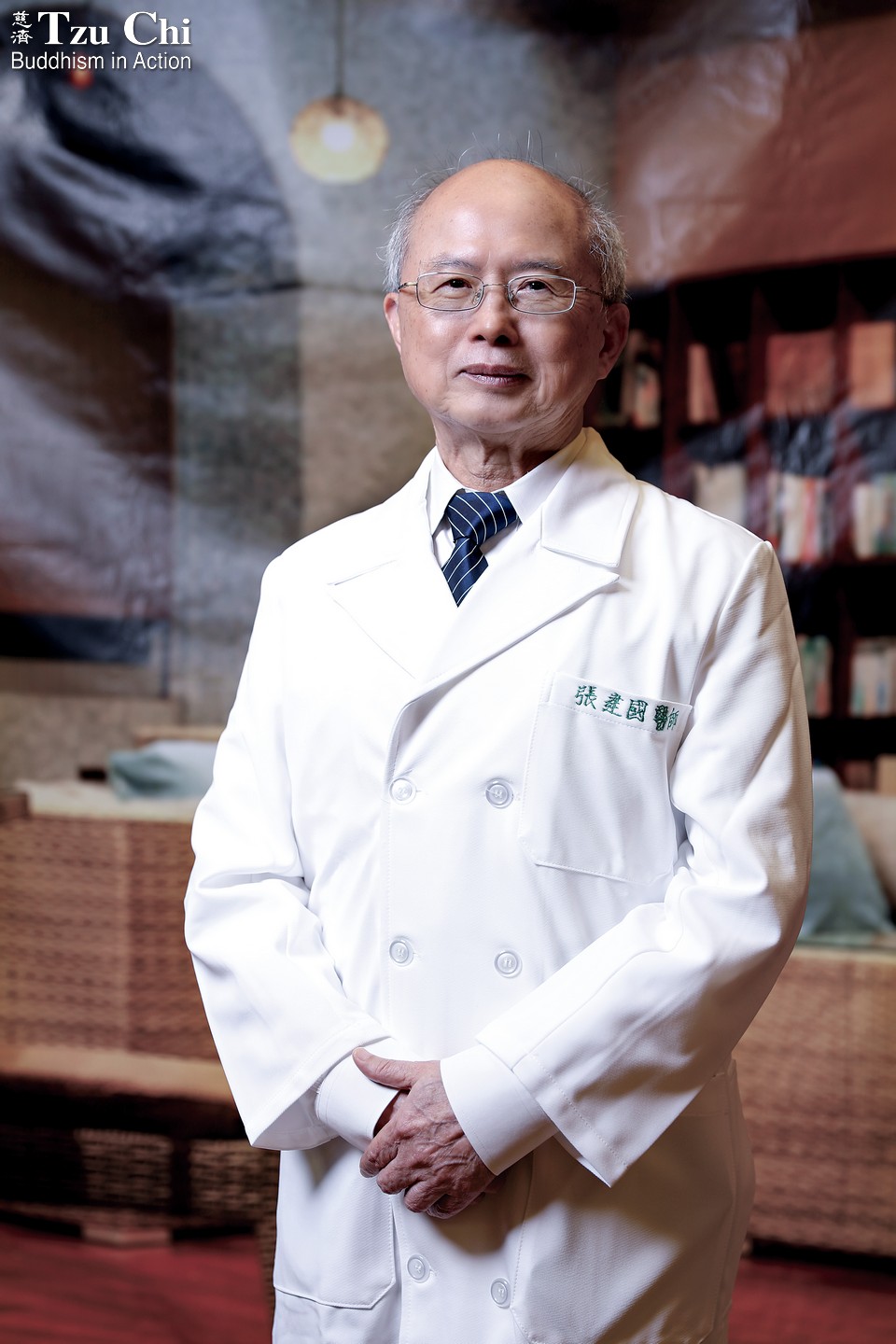
Chang Jan-gowth is a leading authority on whole-genome analysis in Taiwan, using next-generation gene sequencing to develop more effective treatment options for patients.
From illness to rebirth
In the past six months, a remarkable example of the successful integration of traditional Chinese and Western medicine at Hualien Tzu Chi Hospital involved a 39-year-old patient from Hong Kong. Once an accomplished athlete in fencing and swimming, he was diagnosed in 2016 with amyotrophic lateral sclerosis—better known as ALS or Lou Gehrig’s disease. This progressive neurodegenerative disease left him unable to even lift his hands and reliant on a ventilator for survival.
In March of this year, he began treatment at Hualien Tzu Chi Hospital. A team of medical professionals began providing precision care that combines traditional Chinese and Western practices. The team includes Dr. Lin, Dr. Ho, Professor Chang, Neurosurgery Department Director Tsai Sheng-tzung (蔡昇宗), and Vice Director of the Traditional Chinese Medicine Preventive Medicine Center Chen Jhong-kuei (陳中奎). Their approach incorporates acupuncture, herbal medicine, endogenous stem cell therapy, adipose-derived stem cell treatment, and a personalized rehabilitation program. Within five months, the patient experienced obvious improvements in grip strength, enabling him to lift his phone and drink water independently.
Another inspiring story comes from Tu Bo-yu, the patient mentioned at the beginning of this article. In September, his mother, Liao Xing-jun (廖幸君), shared that after six months of treatment, her son had rediscovered his passion for painting and singing. His ability to create art, sing, and engage in limited movements greatly improved his quality of life, leaving everyone in awe.
Reflecting on this journey, Liao recounted the unpredictability of her son’s condition after he fell ill. “One minute he could walk, and the next, he was completely paralyzed,” she said. “I often wondered if I’d wake up to see him alive!” Remembering the difficult days when his lung condition worsened and he struggled with a lack of appetite and could only communicate in fragments, she said, “Now, seeing him speak fluently and draw makes me want to cry. Before, I cried because of his illness; now I cry out of joy.”
Since his diagnosis, Tu Bo-yu has used social media to share his experiences, raising awareness about his rare condition and encouraging others facing similar challenges to find their strength. Dr. Lin Shinn-rong has been a source of encouragement, reminding him that there are still many things he can accomplish in life and urging him to keep striving, helping to instill hope in those who feel hopeless.
Liao expressed her deep gratitude, saying, “My son shares that while falling ill was unfortunate, he has met many kind people along the way, making him feel like the luckiest person. I am truly grateful to the medical team; meeting you all has been such a blessing!”
